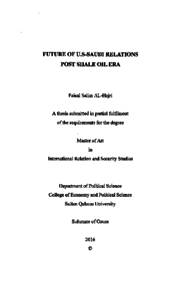Document
Future of U.S-Saudi relations post shale oil era
Publisher
Sultan Qaboos University
Gregorian
2016
Language
English
English abstract
The following thesis investigated the relationship between the U.S. and Saudi Arabia. It examined its most important features, with special consideration over the role of shale oil production for the nature and the extent of the cooperation between the two.
In order to ensure holistic understanding of the subject matter of this thesis, the text focused on historical developments of the relationship between the U.S. and Saudi Arabia, as well as the foreign policy approach of both countries and their most important national interests. Within this framework, the thesis further explored opportunities for cooperation, points of discontent as well as prospects for the future of the relationship. The thesis specifically examined if the current behavior witnessed by both countries in international affairs, as well as potential global developments that are relevant for both of them, speak of further detachment between the U.S. and Saudi Arabia or of renewed merging of their respective strategic interests.
The thesis unveiled that both countries were able to facilitate their own interests within the established framework for cooperation, most notably reciprocal oil interests, political, economic and security interests. The thesis also examined how the increased shale oil production affected the nature of the relationship, especially considering the significance of the leverage that Saudi Arabia had over the U.S. due to its oil exports. Thesis established that this factor significantly impacted the bilateral exchange between the two, making the U.S more independent and Saudi Arabia more creative in the search for additional strategic benefits for attainment of similar goals. The thesis also embarked upon other important areas of cooperation and mutual interests, including but not exclusive to the non-proliferation of weapons of mass destruction, combating terrorism, and ensuring strategic stability of the region. However, further examination also uncovered areas of conflict, particularly the Arab Spring and it implications, the relationship with Iran, cooperation of the U.S. with Israel, connection of the Saudi regime with terrorist cells and extreme religious ideologies, oppressive Saudi regime as well as the anti- Arab climate in the U.S. Additionally, the thesis also explored other strategic options for Saudi Arabia beyond cooperation with the U.S., specifically the newly inaugurated oil related cooperation with Russia.
Overall, this thesis concluded that the nature of the relationship between Saudi Arabia and the U.S. will likely remain fruitful due to a number of common strategic interests both have in the region. However, the identified sore spots also point to the difficulties and potentially lees extensive partnership in the future. Since the excess domestic shale oil production can arguably provide the U.S. with the necessary tool to become somewhat liberated from this partnership, the balance between Washington and Riyadh has the potential of becoming even more complex and challenging.
The thesis further identified areas for future research, specifically the ideological vacuum of international relations theories when it comes to complex and entangled cooperation in the contemporary global system. Additionally, the thesis also recognized the need to study relationships, similar to the one existing between the U.S. and Saudi Arabia, more because they offer an intriguing insight into how common interests can become the main drivers among otherwise extremely conflicting cultures and societies. It provides a good framework for future study of the development of cooperative relationship in the international system, as well as the nature of peace and conflict avoidance.
Member of
Resource URL
Category
Theses and Dissertations

